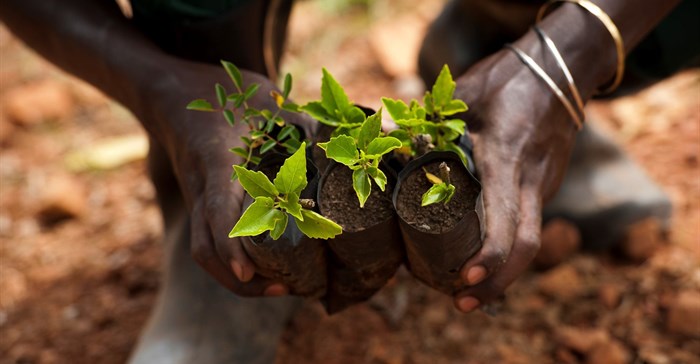
Top stories




Marketing & MediaAds are coming to AI. Does that really have to be such a bad thing?
Ilayaraja Subramanian 22 hours


More news
















While parts of the continent have faced recent food production challenges due to droughts, floods and swarms of locusts, Africa continues to have enough staple food to feed the majority of its citizens', thanks to local farming and imports from other parts of the world.
However, the outbreak of Covid-19 has highlighted the need for the continent to concentrate its efforts on becoming self-sufficient when it comes to the production of certain food like wheat, maize rice and proteins, as well as value-addition and processing of raw materials.
More formalised or efficient value chains in other parts of the world mean that countries in Africa will continue to import certain food but, thanks to the current global outlook, there is an opportunity for Africa to refocus and benefit from the competitive advantages that exist on the continent – arable land, affordable labour, good rainfall in parts and available fresh-water mass.
When it comes to the potential for driving growth in Africa, especially across sub-Saharan Africa, agriculture remains the sector with the most potential. The sector employs 70% of the continent’s population and contributes about 23% to GDP.
Many would agree that Africa has not realised its full potential with regards to farming and that the advent of Covid-19 has emphasised the need to explore ways to become self-sufficient in this area.
One of the ways of doing this is embracing intra-Africa trade in the agribusiness space. Covid-19 has already ignited conversations about deglobalisation as major trade routes were temporarily cut off because of lockdowns around the world, or bottlenecks which occurred in the value chain.
Agriculture and food production are essential services but have not escaped the consequences of shutting down economies and disruptions in global supply chains. These disruptions, when approached differently, present an opportune time to start discussions about regionalisation of agribusiness in Africa.
The current reality is that many countries in Africa are over-reliant on imports from the East or West to meet their food needs. Two-thirds of African countries are net importers of food. Intra-Africa trade provides the opportunity to reduce this reliance on food from outside the continent and ignite more employment opportunities across the food value chain.
If we can move crops efficiently between countries, build partnerships, and broker effective trade deals it would be a significant step on the road to self-reliance. Imagine being able to move crops between Nigeria, the biggest producer of yams and cassavas, and Kenya or between South Africa and Uganda, one of the biggest tea and coffee producers in the world, seamlessly.
This kind of approach, coupled with moves to develop infrastructure that facilitates cross-border trade under the African Continental Free Trade Agreement (AfCFTA), could create exponential growth in intra-Africa trade over the next few years.
It is important to remember that global trade in the form of exports remains critical. Exports provide African countries with foreign exchange to invest in the infrastructure that will be needed to become self-sufficient; infrastructure that will help countries convert raw crops into final food products for consumption, as well as exports.
One also cannot ignore the growing role of technology in Africa’s agricultural sector.
According to the African Development Bank, there are currently more than 350 agritech companies operating on the continent and Covid-19 has accelerated digital adoption across sectors, not just farming. In Africa, 70-80% of produce is produced by smallholders – the majority of whom are subsistence farmers.
All these farmers own a mobile phone and can potentially contribute to the agribusiness value chain by becoming out growers who sell into the milling and processing companies, and to exporters.
The new buzzword in digitisation is “platforms”. By leveraging off the "network effect", the objective is to bring the whole food value chain together to ensure the easy flow of inputs and produce across the value chain while seamlessly enabling payments and collections, as well as access to knowledge and democratizing data.
Sub-Saharan Africa is the ideal playground for this technology based on the complexities around smallholder producers, the lack of infrastructure and markets. It is here, where Standard Bank’s One-Farm proof of concept platform, could unlock the potential of the value chain from farm to fork. This platform aims to bring together a network of digitised solutions that could unlock the ability of all our clients – from input suppliers to offtakers and corporates who facilitate the trade – and ultimately improve the quality and quantity of agricultural output across the continent.
For agribusiness to grow farmers and everyone else in the value chain must embrace these technologies which improve crop yields, lower costs, create efficiencies and bring them closer to the end consumer.
Governments and regulators are taking stock of global shifts that have been brought about by Covid-19. They are seeing a moderation from pure reliance on globalisation and a shift towards deglobalisation in respect of food security. Covid-19 has also cast a harsh light on many countries’ over-reliance on food imports and the challenges during a pandemic.
All of these factors point to the need to examine how Africa reimagines agribusiness and the opportunities it presents.
As we continue to navigate the pandemic, Africa has been presented with an opportunity to strengthen regional relations in agribusiness and finally start down the road to self-sufficiency when it comes to food security.